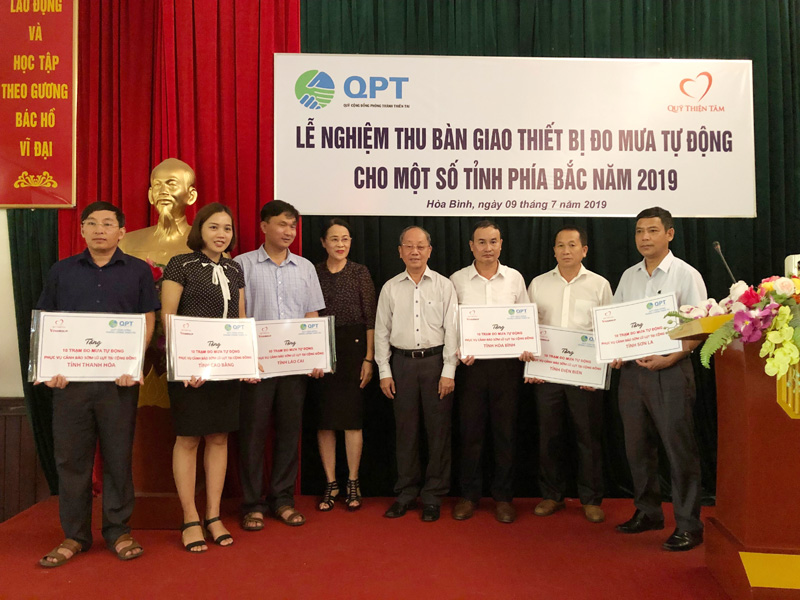
(HBO) - The Fund for Community-based Natural Disaster Prevention on July 9 held a ceremony in the north western province of Hoa Binh to hand over automatic rain gauge systems to a number of northern provinces in 2019.
 Representative
of the fund handed over automatic rain gauge systems to the localities.
Representative
of the fund handed over automatic rain gauge systems to the localities.
The Fund for Community-based Natural Disaster
Prevention launched a programme to install 65 automatic rain gauge systems in
65 communes of Lao Cai, Dien Bien, Cao Bang, Son La, Hoa Binh, Thanh Hoa and
Nghe An provinces. To date, the installation of all systems has been completed.
The programme was carried out for 40 days,
starting from May 20. The date for completion of installation and start of
operation was June 26, which was 20 days ahead of schedule. Total cost of the
programme was 2.47 trillion VND (106.58 million USD).
Each system comprises of a rain gauge
sensor; data collection, processing and transmission sub-system and a technical
box; a rain gauge tripod mast; a management and monitoring programme for data
transmission, and a smart phone app.
In Hoa Binh, 10 systems were installed in
the districts of Cao Phong, Mai Chau, Tan Lac, Lac Son, Yen Thuy, Kim Boi,
Luong Son and Da Bac.
After the installation, the automatic rain
gauge systems in the localities were put into operation.
At the event, leaders of the fund asked the
localities to make full use of the automatic rain gauge systems in order to
issue early warnings, helping local people take the initiative during flooding
and rainy seasons and minimise damage of natural disasters.
Furthermore, maintenance is crucial to
ensure long-standing effects of the systems, and the localities should work to
raise people’s awareness of the activities of the rain gauge stations, thus
they will understand and help to maintain the systems.
The localities were also asked to submit
reports to the fund after one year of use, for assessment of the system’s
efficiency; as well as work with the fund to improve disaster preparedness for
local residents in the coming year./.
Hoa Binh province is undergoing a dynamic transformation amid Vietnam’s national digital transition. Building on Poliburo’s Resolution No. 57-NQ/TW on breakthroughs in science, technology, innovation, and national digital transformation, the province has rolled out a wide range of practical action plans. A standout initiative is the "Digital Literacy for All” movement, an effort to ensure that no one is left behind in the digital era.
Hoa Binh province is undergoing a dynamic transformation in the wake of the national digital transformation movement. Building on Resolution No. 57-NQ/TW of the Politburo on breakthroughs in science, technology, innovation, and national digital transformation, the province has implemented a wide range of practical action plans. A standout initiative is the "Digital Literacy for All” movement ambitious effort to ensure that no one is left behind in the digital age.
With a spirit of unity and proactive problem-solving, the Party Committee, the government and the people of Dong Lai Commune (Tan Lac District) have made great strides in implementing the resolutions of the 24th Party Congress of the commune for the 2020 - 2025 term. Focusing on leadership and practical actions, the commune has brought the Party’s resolutions into daily life, creating strong impacts and pushing the local development forward.
Amid the nationwide push for digital transformation, young people in Hoa Binh Province are stepping up as dynamic pioneers, applying technology to enhance Youth Union operations and expand the reach of youth-led initiatives. Through creativity and adaptability, Youth Union organizations at all levels have introduced a series of practical solutions, contributing to modern governance and community development.
In recent years, An Nghia commune, located in Lac Son district, has stepped up administrative reform, focusing on improving the quality and efficiency of its single-window service unit for receiving and processing administrative procedures. These improvements have helped create favourable conditions for local residents and organisations to handle administrative procedures, contributing to the commune’s broader socio-economic development.
The Prime Minister-approved master plan to develop the multi-use value of forests ecosystems through 2030, with a vision to 2050, aims to improve the management and sustainable use of forest resources, create jobs, increase incomes, and improve the living standards of ethnic minorities, people in mountainous and remote areas, forest workers and those living near forests.



 Representative
of the fund handed over automatic rain gauge systems to the localities.
Representative
of the fund handed over automatic rain gauge systems to the localities.